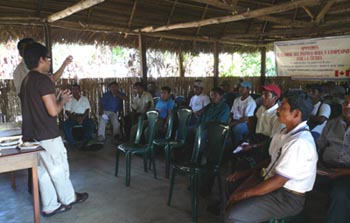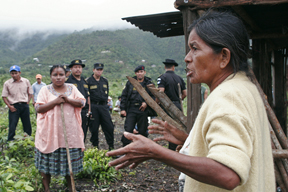|
El ESTOR, Guatemala - Beneath the 17 Maya Q'eqchi' villages that line the shores of Lake de Izabal lie rich deposits of nickel, a metal used to reinforce steel used to construct the world's skyscrapers.
HISTORY
More than 40 years ago, unbeknownst to the Maya Q'eqchi', the Guatemalan government sold a concession on their lands to Inco, a Canadian mining giant. Inco mined El Estor's nickel for nearly 20 years, wreaking incalculable damage to the environment before abandoning the mine in the late 1970s when the price of nickel plummeted. Inco then sold its rights to another Canadian company, Skye Resources of Vancouver, B.C.
As the price of nickel has skyrocketed, so too has interest in what lies below these Maya villages. Long-standing opposition to the resumption of mining by the Maya Q'eqchi has grown as well. This has led to bloodshed and a series of serious human rights abuses.
VILLAGES BURNED
In January 2007, 450 police officers and 250 soldiers forcibly evicted hundreds of Maya families and burned their homes. Actual footage of the eviction can be viewed on You Tube at http://www.youtube.com/watch?v=Q20YxkM-CGI
Also see "Mining Misery" by This Magazine in their March-April 2007 issue at http://www.mimundo.org/Published/0702ThisMag2.pdf
LIVES THREATENED
In late 2006, the lives of three leaders of Defensoria Q'eqchi' were threatened by elements believed to be closely connected to the mining project. The Indian Law Resource Center immediately sought intervention from the Inter-American Commission on Human Rights, (IACHR) which ordered the Guatemalan government to take firm measures to protect the lives of these three individuals.
LEGAL ACTION
 Community resistance: Crippa and local leaders discuss human rights violations. Photo by Shayda Naficy. |
Armstrong Wiggins, Director of our Washington, D.C. office, and staff attorney Leonardo Crippa traveled to Guatemala to meet with our clients and to negotiate with the Guatemalan government for the implementation of the IACHR-mandated measures. As a result of that meeting, an agreement was reached to implement protective measures by the government. Since 2007, we have secured protective measures for five Maya Q'eqchi' leaders.
While the immediate threat to the lives of our clients has abated, work continues to persuade the Guatemalan government to respect the land rights of the Maya Q'eqchi'. Local counsel has been hired to exhaust domestic legal remedies as we prepare for a thematic hearing before the Inter-American Commission on Human Rights on March 10, 2008 in Washington, D.C. where Crippa will present arguments in preparation for a formal case.
